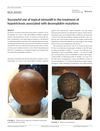 16 citations,
May 2020 in “Frontiers in pharmacology”
16 citations,
May 2020 in “Frontiers in pharmacology” Minoxidil can stop the growth of ovarian cancer cells without harming the heart.
 7 citations,
January 2020 in “Journal of Dermatology”
7 citations,
January 2020 in “Journal of Dermatology” Cantu syndrome, which causes excessive hair growth and skin issues, is due to a mutation in the ABCC9 gene, and understanding this could help develop new treatments for hair diseases.
 6 citations,
May 2020 in “Pharmacology Research & Perspectives”
6 citations,
May 2020 in “Pharmacology Research & Perspectives” A new gel form of minoxidil is equally effective for hair growth and safer for the heart and other organs than the traditional solution.
 24 citations,
April 2014 in “Oncotarget”
24 citations,
April 2014 in “Oncotarget” Minoxidil can reduce functions related to androgen receptors.
 1 citations,
April 2023 in “Biomolecules”
1 citations,
April 2023 in “Biomolecules” Fermented papaya and mangosteen in hair care products helped prevent hair loss and improve hair thickness.
 February 2024 in “International Journal of Molecular Sciences”
February 2024 in “International Journal of Molecular Sciences” Hair loss in Androgenetic Alopecia is caused by genetics, aging, and lifestyle, leading to hair follicle shrinkage and related health risks.
5 citations,
May 2022 in “Clinical & Experimental Metastasis” Minoxidil and ranolazine together can reduce the spread of certain breast cancer cells.
 40 citations,
July 1995 in “Toxicologic Pathology”
40 citations,
July 1995 in “Toxicologic Pathology” Minoxidil can harm dog's heart.
 83 citations,
December 2001 in “Journal of Investigative Dermatology”
83 citations,
December 2001 in “Journal of Investigative Dermatology” Minoxidil boosts hair growth by targeting adenosine and possibly sulfonylurea receptor 2B.
 41 citations,
January 2007 in “Journal of Korean Medical Science”
41 citations,
January 2007 in “Journal of Korean Medical Science” Minoxidil and ATRA together boost hair growth more effectively than minoxidil alone.
 33 citations,
August 2018 in “Facial Plastic Surgery Clinics of North America”
33 citations,
August 2018 in “Facial Plastic Surgery Clinics of North America” The document explains hair biology, the causes of hair loss, and reviews various hair loss treatments.
 33 citations,
November 1994 in “Archives of Biochemistry and Biophysics”
33 citations,
November 1994 in “Archives of Biochemistry and Biophysics”  12 citations,
July 2020 in “Dermatologic Therapy”
12 citations,
July 2020 in “Dermatologic Therapy” Minoxidil, applied on the skin or taken orally, can improve hair growth in kids, but more research is needed due to possible side effects.
 12 citations,
February 2010 in “Tetrahedron Letters”
12 citations,
February 2010 in “Tetrahedron Letters” New minoxidil compounds with better water solubility were made, but their full effects and safety need more research.
 10 citations,
February 2016 in “Anais Brasileiros de Dermatologia”
10 citations,
February 2016 in “Anais Brasileiros de Dermatologia” Topical minoxidil can cause excessive hair growth in children, so use it carefully.
 1 citations,
August 2019 in “Pediatric dermatology”
1 citations,
August 2019 in “Pediatric dermatology” Topical minoxidil helped an 8-year-old boy with a genetic hair disorder grow hair.

Human scalp hair follicles have PGE2 and its receptors, which might affect hair growth.
 14 citations,
January 2018 in “Endocrine”
14 citations,
January 2018 in “Endocrine” Cantú syndrome may be linked to pituitary adenomas.
 41 citations,
June 2006 in “Journal of Investigative Dermatology”
41 citations,
June 2006 in “Journal of Investigative Dermatology” Beard and scalp hair cells have different gene expressions, which may affect beard growth characteristics.
 32 citations,
March 2013 in “Journal of Pharmaceutical Sciences”
32 citations,
March 2013 in “Journal of Pharmaceutical Sciences” Iontophoresis improves minoxidil delivery for alopecia treatment.
 25 citations,
January 2002 in “Folia Pharmacologica Japonica”
25 citations,
January 2002 in “Folia Pharmacologica Japonica” Minoxidil helps hair grow by improving blood flow and increasing growth factors in hair follicles.
 6 citations,
September 2012 in “Aesthetic Plastic Surgery”
6 citations,
September 2012 in “Aesthetic Plastic Surgery” Minoxidil applied before and after surgery improves skin flap survival in rats.
 3 citations,
April 2010 in “Journal of Receptors and Signal Transduction”
3 citations,
April 2010 in “Journal of Receptors and Signal Transduction” Minoxidil, a common alopecia medication, might cause eye changes due to its properties and lack of tissue selectivity.
 January 2018 in “Elsevier eBooks”
January 2018 in “Elsevier eBooks” Minoxidil helps lower severe blood pressure and promotes hair growth but can have serious side effects and must be used continuously.

Topical minoxidil helps treat hair loss in teens, but more research needed for safe options.
 55 citations,
July 2016 in “Dermatologic Therapy”
55 citations,
July 2016 in “Dermatologic Therapy” Multiple treatments work best for hair loss.
 29 citations,
December 2003 in “Teratology”
29 citations,
December 2003 in “Teratology” Minoxidil use during pregnancy may cause fetal harm.
 19 citations,
October 2017 in “The FASEB Journal”
19 citations,
October 2017 in “The FASEB Journal” Male hormones cause different growth in identical human hair follicles due to their unique epigenetic characteristics.
 2 citations,
October 2015 in “Human Gene Therapy”
2 citations,
October 2015 in “Human Gene Therapy” The congress highlighted new gene therapy techniques and cell transplantation methods for treating diseases.
 July 2024 in “Forum Dermatologicum”
July 2024 in “Forum Dermatologicum” Topical treatments for hair loss can be effective but need careful safety evaluation.





























